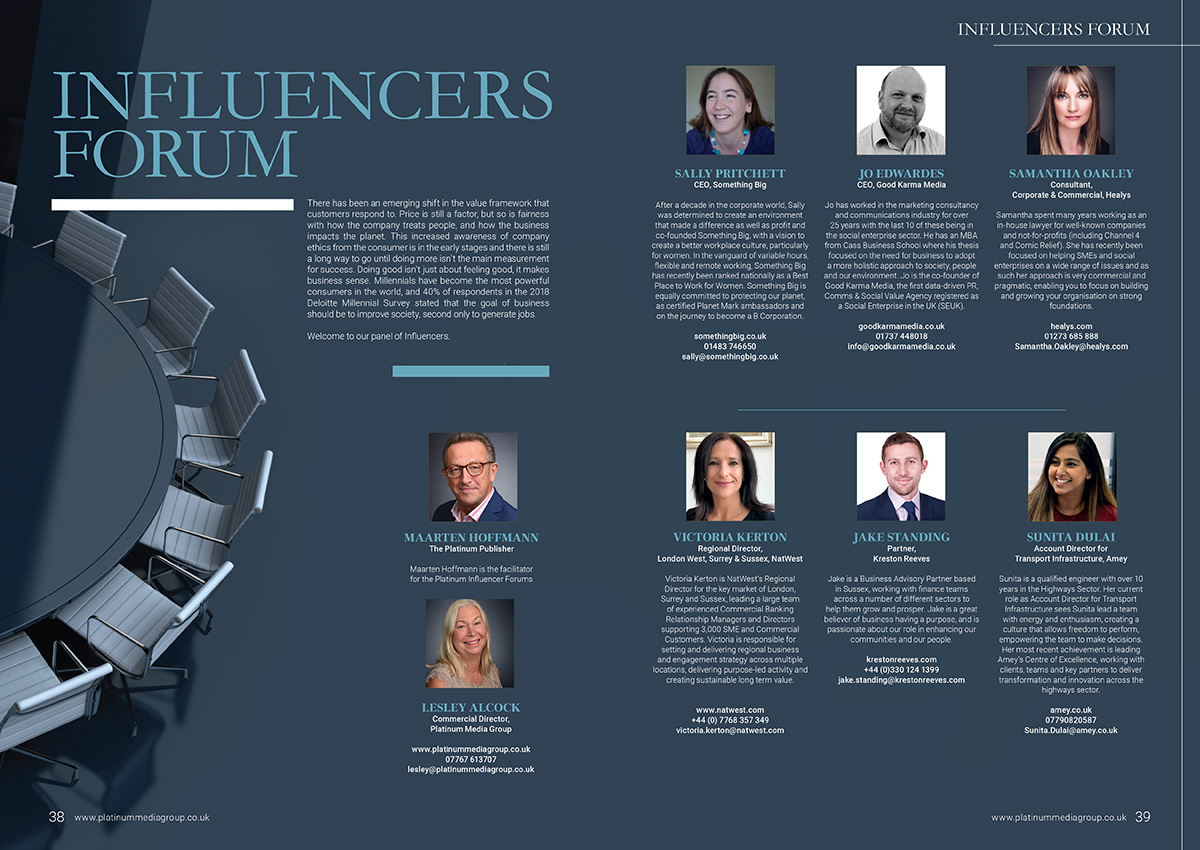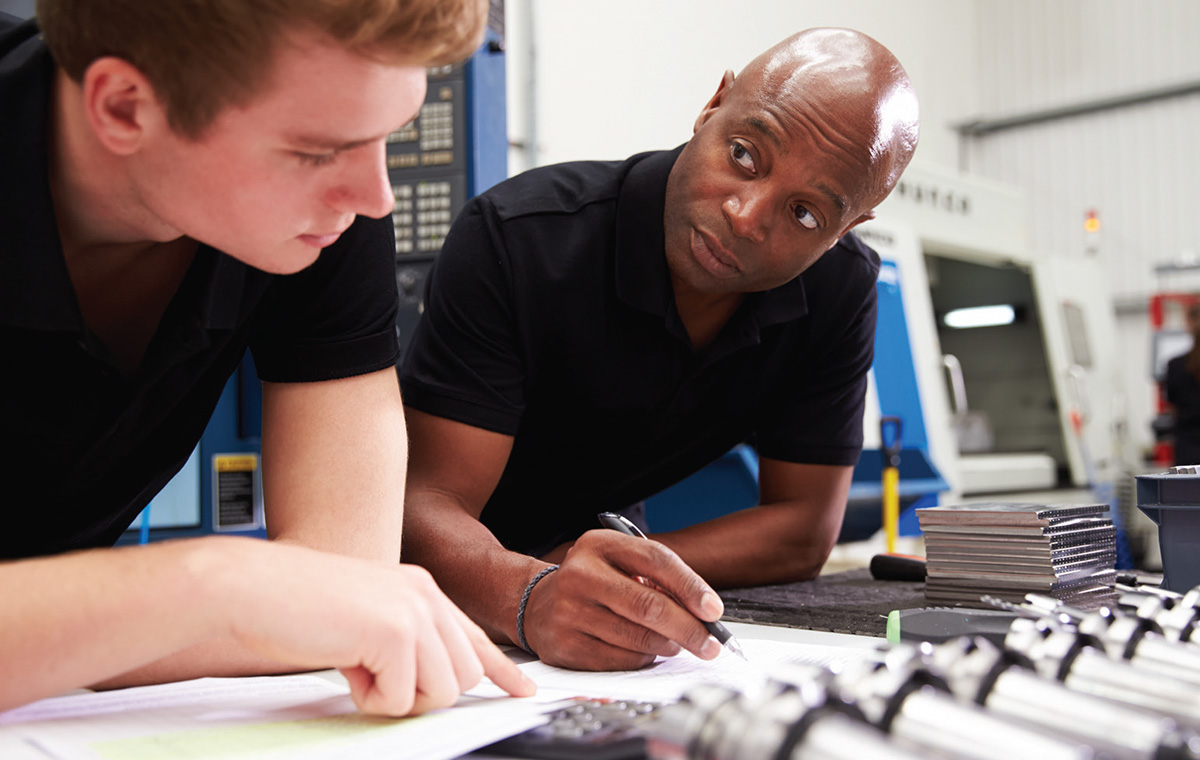
There has been an emerging shift in the value framework that customers respond to. Price is still a factor, but so is fairness with how the company treats people, and how the business impacts the planet. This increased awareness of company ethics from the consumer is in the early stages and there is still a long way to go until doing more isn't the main measurement for success. Doing good isn't just about feeling good, it makes business sense. Millennials have become the most powerful consumers in the world, and 40% of respondents in the 2018 Deloitte Millennial Survey stated that the goal of business should be to improve society, second only to generate jobs.
Welcome to our panel of Influencers.
Sally Pritchett CEO, Something Big
After a decade in the corporate world, Sally was determined to create an environment that made a difference as well as profit and co-founded Something Big, with a vision to create a better workplace culture, particularly for women. In the vanguard of variable hours, flexible and remote working, Something Big has recently been ranked nationally as a Best Place to Work for Women. Something Big is equally committed to protecting our planet, as certified Planet Mark ambassadors and on the journey to become a B Corporation.
somethingbig.co.uk
01483 746650
sally@somethingbig.co.uk
Jo Edwardes CEO, Good Karma Media
Jo has worked in the marketing consultancy and communications industry for over 25 years with the last 10 of these being in the social enterprise sector. He has an MBA from Cass Business School where his thesis focused on the need for business to adopt a more holistic approach to society, people and our environment. Jo is the co-founder of Good Karma Media, the first data-driven PR, Comms & Social Value Agency registered as a Social Enterprise in the UK (SEUK).
goodkarmamedia.co.uk
01737 448018
info@goodkarmamedia.co.uk
Samantha Oakley Consultant, Corporate & Commercial, Healys
Samantha spent many years working as an in-house lawyer for well-known companies and not-for-profits (including Channel 4 and Comic Relief). She has recently been focused on helping SMEs and social enterprises on a wide range of issues and as such her approach is very commercial and pragmatic, enabling you to focus on building and growing your organisation on strong foundations.
healys.com
01273 685 888
Samantha.Oakley@healys.com
Victoria Kerton Regional Director, London West, Surrey & Sussex, NatWest
Victoria Kerton is NatWest’s Regional Director for the key market of London, Surrey and Sussex, leading a large team of experienced Commercial Banking Relationship Managers and Directors supporting 3,000 SME and Commercial Customers. Victoria is responsible for setting and delivering regional business and engagement strategy across multiple locations, delivering purpose-led activity and creating sustainable long term value.
www.natwest.com
+44 (0) 7768 357 349
victoria.kerton@natwest.com
Jake Standing Partner, Kreston Reeves
Jake is a Business Advisory Partner based in Sussex, working with finance teams across a number of different sectors to help them grow and prosper. Jake is a great believer of business having a purpose, and is passionate about our role in enhancing our communities and our people.
krestonreeves.com
+44 (0)330 124 1399
jake.standing@krestonreeves.com
Sunita Dulai Account Director for Transport Infrastructure, Amey
Sunita is a qualified engineer with over 10 years in the Highways Sector. Her current role as Account Director for Transport Infrastructure sees Sunita lead a team with energy and enthusiasm, creating a culture that allows freedom to perform, empowering the team to make decisions. Her most recent achievement is leading Amey’s Centre of Excellence, working with clients, teams and key partners to deliver transformation and innovation across the highways sector.
amey.co.uk
07790 820587
Sunita.Dulai@amey.co.uk
What is the kindness economy?
SP: I think the word ‘kindness’ sounds a bit soft. ‘Kindness’ suggests that we are there just to do nice stuff. I don’t think it is that anymore, I think it is about improving society. There’s no reason why doing good can’t be good for business. I think this isn’t a new phenomenon though, this has come from this balanced scorecard that we have had for decades where we speak about the triple bottom line, so this is the people, profit and planning. Kindness has got accelerated during Covid because we were talking about being kind. But, there’s nothing soft about kindness, it is a critical part of business.
Well as you say, it makes complete business sense, but how does someone enact a kindness economy?
VK: NatWest launched its purpose-led strategy on February 14th last year and it fundamentally rewrote the way we approached our decision making, the way we engaged with our communities and our vision statements. The purpose-led strategy identified three main pillars, and whilst kindness wasn’t specifically named it was absolutely fundamental to its ethos. ‘Kindness’ means you’re creating a relationship and an environment of trust and that is essential to all good business relations. ‘Kindness’ means you’re creating an environment of psychological safety that gives you a space to be innovative, collaborative and creative, all of those are essential ingredients to strong fundamental business relations that will take you into the future.
JE: We’re one of those cohorts of organisation that have the concept embedded in our structure as well. We are a registered social enterprise, and what that means is on our articles of association it’s hardwired that no less than 50% of our profits will be going back into the community. It’s a very firm commitment from us in that regard.
That also feeds into the employee side, there is also such a fundamental desire of human beings to be more than just a producer of something, this sense of purpose is very important and it gives us a sense of meaning in our lives.
SD: I completely agree, for us, it’s been very much around local communities, we work on contracts around the UK, most of our contracts are local, in Surrey, it’s the Waste Corp Partnership Contract. It’s very much about partnerships and working collaboratively. We do it for employee engagement, that’s a big part of kindness as a lot of those employees are local, but also it’s a public contract, so it’s something we’ve been doing for a long time. Kindness is very much built into our organisation, it’s not just a strapline, we work to understand local issues, and work through those collaboratively with our client, bringing people together.
Are you saying that the kindness economy is as attractive to the employee as it is to the consumer?
SD: Yes, especially as 90% of our employees will be based in the area that we are working in, it’s where they live, they have family there. You get so much more engagement when people are brought into what you do. During Covid, we became a frontline service, so our message became about having pride in the services we provide. Everybody took on board that message, and we also introduced the real living wage, and taken together this has made our employee engagement the highest we’ve seen.
Does this approach change when put under the lens of accounting though?
JS: What we have seen in clients, and also within Kreston Reeves, is that when we have put on a purpose-led strategy like Victoria was saying, that has really helped with getting better employee engagement and affinity with our brand and what we stand for. One of the things we have seen is that speaking about kindness is not the same as actually doing something for kindness. I’m sure we have all seen what is happening with BrewDog at the moment. I think it just goes to show that you have to have that kindness embedded in your organisations, and not just as a marketing strapline.
SO: I think that when it comes to the example of BrewDog, it happened because there perhaps isn’t enough legislation that forces people to be kind, and so they can just get away with it being a strapline. We have the Equality Act, now 11 years old, but that’s being fundamentally ignored by too many people. This isn’t just employers like BrewDog, it’s also your supply chain, it covers everything. We can’t separate the terms ‘kindness’ and ‘economy’, we have to integrate them, otherwise we will continue to see attempts to get around the ‘kindness’ part.
To me, legislation is the antithesis of what we are talking about here, it seems that this is driven by people rather than obeying the law. I think it starts with a surge down below which wants a kinder economy, it starts with people. Is that the case, is legislation the enemy of it?
JE: No I think they work in harmony. There’s also the Social Value Act 2012, which has just been updated this year to become tougher. That’s a very wise and very good policy that drives all the right changes that we need. I think what’s interesting is that people do take it up, there is not too much resistance with these changes and these concepts. When you start to take steps as an individual in the direction of kindness, you give others the permission to do so as well, and they respond to that. People do take the permission you grant them to be kind which indicates that we might not have to entirely force them with legislation.
VK: I think that’s a really interesting point, whether you talk about it as being leader led in a larger organisation or whether you talk about it being the taking of permission to do things. I’ve worked in banking my entire career and it has radically transformed in terms of the way we evaluate, the way we engage and the sort of leadership traits that we look to. That’s really been in the last few years, partly because we’ve taken permission, and partly because I think there’s been a recognition that the old way, the macho culture, doesn’t work, and instead we need different ways to stimulate and support. I think a big part of this is because so many people remember the financial crisis and the dot-com bubble, and how those old ways led us there.
Do we feel that the kindness economy is essentially female-driven?
JE: What I can say is that there is a higher percentage of female leaders in the social enterprise sector, statistically. That would say that statistically there does seem to be a balancing, not hugely led, but a balancing.
SD: I think diversity as a whole brings change. I’m not saying that it’s led the kindness economy, but it brings change and a different way of thinking that you wouldn’t necessarily have if you had your traditional older white male in charge.
SO: I don’t think you would get that diversity without legislation, it’s legislation that forces the men to change. Certain companies have to have a certain level of representation and have to have a level of equal pay, which is a level of equality and diversity that is enforced by law.
VK: I feel slightly uncomfortable saying that the kindness economy is women-driven, or because of the rise of women; undoubtedly women have played a role but it’s not the main or only reason, it’s diversity that is the driver. Diversity has absolutely been the main force behind all of this, it’s that diversity of thought and approach that gives viewpoints that we wouldn’t have had before and the ability to challenge and try to do new things. Legislation has been something that allows us to do that.
What are the benefits of the kindness economy?
SP: Let’s be clear about the fact that the economic benefits of this are huge. We’re just coming through the recovery from the pandemic, without engaging our employees we are not going to get the talent we need, and we’re not going to keep that talent. We don’t do this community work and engaging our employees for nice reasons, we do it because we need to keep that talent within our organisations. Kindness gives us the ability to retain and develop our employees, where without it we wouldn’t be able to.
VK: So bringing it into a business meeting or into a collaboration meeting, if you’ve got kindness as a way of engaging with your colleagues you’re going to create a sense of trust. If you’re trying to create a new campaign, innovate or workshop new ideas for products and have kindness as your core ethos, then you will have people willing to speak up and share. They might be stupid ideas, they might be brilliant ideas, but they will vocalise them, so it’s an essential ingredient to creating a culture that provides innovation and creativity, that is the bottom line when it comes to keeping the business relevant.
SD: I think it’s definitely landed that kindness drives good business, we’ve shifted our language and culture to ‘freedom to perform’. If I don’t need to tell anybody I’m here and I can be accountable for the decisions I make, at every level, then you take away the noise that comes from making good decisions. We’ve really tried to empower our people to make good decisions so that they have a voice and they aren’t going to get in trouble for using it.
SP: Exactly, I completely agree. From a people perspective, it makes good business when we do that. I’d say if you’re going to do any sort of marketing campaign this year, one of the greatest opportunities we have this year is sustainability. If you’ve got a way of increasing the sustainability of your products or services, then that’s the campaign to run right now because of demand, thats the popular message that’s out there. Again, it makes good business sense, kindness is the friend of the economy I would say, particularly in this era.
This all sounds amazing, but do you think we are still in an early enough stage for this to get reverted, perhaps after the pandemic ends?
JE: Nearly a decade ago, Sir Ronald Cohen predicted that the social value movement would last 30 years until it became mainstream. We are about a third of the way through, and that’s where you start to see the hockey sticks, but for this I think it will make it past that stage and reach that 30-year mark.
JS: There has been a shift in how shareholders and your supply chain will work with you if you don’t fulfil a level of kindness in your business. Their expectations have shifted, likely pandemic accelerated, and they simply won’t work with you or allow contracts to operate unless you demonstrate certain social values. With that in place already, I feel that it won’t change for the worse in the future.
VK: Precisely, and this is a cost that businesses are held to, if they don’t demonstrate those values then their costs increase; you can’t just ignore that after the pandemic. PLCs now have to report their climate and sustainability objectives, that’s something they have to do from a regulatory position, but it’s also essential for their own frameworks operations. So, we have PLCs, VC’s and PC’s doing it, it’s being embedded into procurement contracts and supply chains and ways of doing business.
But if one runs a company with very low margins you can understand that they might think they cannot afford the luxury of kindness?
SD: Coming at it from an organisation that doesn’t make a lot of money, it has to be about more than the margins because it’s the lasting impact that matters for us. Yes, that contract needs to be able to make some money, and meet margins that we forecast, but actually what our clients are interested in is that impact. That’s the shift in government organisations, they are starting to think broader, and maybe more so than private organisations as we aren’t incentivised in the same way. The way we invest isn’t so much about how much you’re investing financially, but rather about how you bring those resources together so it’s not always about having to spend money on something to recover it, it could be time.
Looking at this from a slightly different angle then, the online retailer, Boohoo has been shown to have atrocious working conditions and now we are told about their use of virgin plastic to make 49% of their items. Their shares dropped for a few minutes then bounced back up again - is there a point where unethical products are too cheap for the consumer to ignore? Does this do anything to show that people might not care about the kindness economy?
SP: People will write reviews and raise awareness. If you say things or act in a way that isn’t right you will come unstuck, we live in a world where there aren’t any ivory towers anymore.
JS: However, with everything being in the spotlight it means that anything that does enter that spotlight is only news for a few moments before the next thing replaces it. This level of massive conn-ectivity goes both ways, unfortunately.
JE: I’d say sometimes people are willing to spend more, the stats certainly show that some demographics are willing to pay more in certain areas, it does tend to be among the wealthier groups of society, although interestingly the less well off demographic give more as a proportion certainly. The bigger question here is the debate between gaining profit and doing good. You have to move the dial, it has to change.
JS: That’s what I was going to say, money does make the world go around. We talked about the cost of doing things, of course there is a cost to do something like this but if they do then they will improve their bottom lines, so they’re still driven by getting a larger reward out of what they do. It’s a matter of under-standing that the cost of doing it is outweighed by the gain of having done it. It’s an investment.
SO: I’m someone of a certain generation that remembers when the Body Shop and recycling was starting alongside free trade but it all got left behind. It took a while but it’s back and I see it as a very encouraging return.
With this idea that it’s all about money, is there any way to move away from that idea, to move towards a mentality that is based on doing good?
JS: We already accept lower recovery rates to work with charities and social organisations, so in effect we are already doing that. That’s not just a Kreston Reeves thing though, a lot of businesses in professional services do that, and so I think that is imbedded in professional services and how we work.
SD: I think that if anything is to change over the next couple of years it is the way businesses work together, it needs to be more about collaboration. We need to look at the supply chain and the circular economy, is there any small thing that we or other members can do that is sustainable or beneficial? It’s those small things that we all can do which will make a big difference. We can’t be looking at it in terms of purely ‘what’s in it for me’ we need to look at it in a broader sense, and that’s how we can change.
VK: I completely agree and I feel it’s the responsibility of large businesses to lead the way. At NatWest we are working with Blueprint For Better Business, which help inform and guide us on how to be a better business. Through every single forum, whether it be supply chain or risk forum, we have to articulate how doing that piece of business actually aligns with our pillars of purpose. We have to articulate the relevance of that business with our social values. That’s the difference and that drives change and cooperation. I think there is huge potential for large business to lead the way with that.
SP: Money talks, but we often are running businesses for a purpose, because we feel we can do something better. B corp is our version of your Blueprint For Better Business and I’m an example of this, we’re trying to be a B corp and we have been for the last year. That’s about more than profit, we have to put a lot of effort into that.
SO: I think B corps are unnecessarily bureaucratic, they are aimed at large businesses and have taken all of those principles and tried to put it on top of SMEs. Maybe if you’re at the higher end of SME you can do it, but the smaller groups who are genuinely doing the good simply can’t get the badge to show it, and that’s such a shame. There needs to be a better way, but it is definitely a start.
As a final statement to our readers then, what is the kindness economy to you?
JS: For Kreston Reeves, we make sure everything we do looks after our clients, colleagues and communities, so that factors into the profit element, but also the people and predominately our planet. It’s working with those people and groups in a sustainable and positive way that embodies the kindness economy for us.
SO: For me personally I don’t think we can separate out kindness and economy, I think the two go hand in hand. I hope that this forum has shown my understanding that this is the future, it’s about developing us as a people, one impacts the other.
JE: The word Karma means action, good action ideally. The kindness economy means a chance to act more and to be authentic around that. I hope it’s a recognition of the reality of the importance of the connectivity between people, places and planet. I feel that an increased understanding of that will naturally change things.
VK: The kindness economy is integral to a compassionate, empathetic and trustworthy environment, which means that the communities that you participate in can rely on you. By enabling that reliance you enable those communities and families to thrive.
SD: I think I see us as that enabler for the kindness economy, whether that is for the communities or our staff. It’s about doing it now and not waiting for another generation to do it, it’s here right now, lets make the impact when we can. When you take it down to a personal level it’s about doing what’s right for you, and all of that adds up to the organisation that you work for, and that’s where our culture of kindness comes from.
SP: For us, it’s about how being a good business is good for business. We’ve made this commitment to our people, profit and clients, and for those clients that is about helping to make their workplace better and doing better business as a result of being better people. Ultimately as a person, I feel like I want to leave a legacy that is bigger than just saying “I’ve run a business”, I want that to be a positive legacy. I think that resonates a little with everyone. To sum it up in a quote from Mary Portas, it’s about “Planting the trees that we are not going to sit beneath”.
I would like to thank all our Influencers for a fascinating discussion. My take-away from this is that enacting the kindness economy makes good business sense – not just for how you feel but for the bottom line. I will apologise in advance for this but l don’t think most corporate CEOs prioritise this in their business life – they are responsible for the bottom line and shareholders will be all over them if it suffers for any reason. Convince them that kindness is good for the bottom line and progress will really be made. l must say, the panel have convinced me that this is the case and after the extraordinary 18 months we have had, if not now – when?






